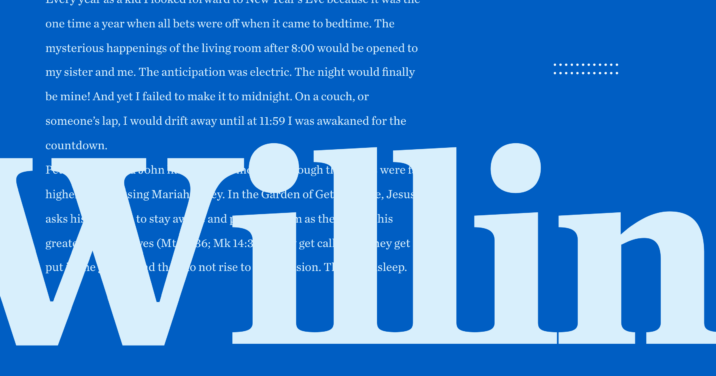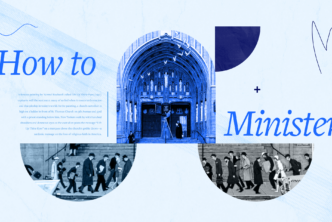The spirit indeed is willing, but the flesh is weak.—Matthew 26:41; Mark 14:38
Every year as a kid I looked forward to New Year’s Eve because it was the one time a year when all bets were off when it came to bedtime. The mysterious happenings of the living room after 8:00 would be opened to my sister and me. The anticipation was electric. The night would finally be mine! And yet I failed to make it to midnight. On a couch, or someone’s lap, I would drift away until at 11:59 I was awakened for the countdown.
Peter, James, and John had a similar moment, though the stakes were far higher than missing Mariah Carey. In the Garden of Gethsemane, Jesus asks his disciples to stay awake and pray with him as the hour of his greatest need arrives (Matt 26:36; Mark 14:32). They get called up, they get put in the game—and they do not rise to the occasion. They fall asleep.
It’s when Jesus returns from his own prayer to find them snoozing that he utters the infamous line “The spirit indeed is willing, but the flesh is weak.”
What is interesting though, is that when Jesus says this, he says it to only one of the three disciples. Both Matthew and Mark say that “he came and found them sleeping” (Matt 26:40; Mark 14:37)—but he does not address them. Instead, in each Gospel, after Jesus finds all three of “them” sleeping, “he said to Peter, ‘So, could you not watch one hour? Watch and pray that you may not enter into temptation. The spirit indeed is willing, but the flesh is weak.’”
Matthew and Mark go out of their way to make it clear that Jesus says this to Peter and Peter alone. Mark even quotes Jesus as beginning the statement with, “Simon, are you asleep—?” Jesus finds all three sleeping, and yet when he makes the statement about the spirit being willing and flesh being weak, he says it directly to just one disciple. Why?
Of willingness and weakness
Earlier that night, Jesus had told his disciples, “You will all fall away” (Matt 26:3; Mark 14:27). He says this, too, to all twelve: “to them.” But only one of them bursts out in response to say that even if the rest of the disciples deserted Jesus, he would never do so. (Any guesses as to which disciple?)
Right in the face of Jesus saying that all twelve of his closest disciples will abandon him, Peter is the only one to swear that he won’t be included: “Though they all fall away because of you, I will never fall away” (Matt 26:33; Mark 14:27). Jesus responds by telling Peter that he will not only fall away, but will deny Jesus outright three times. Peter, clearly more omniscient than Jesus, responds confidently again, “Even if I must die with you I will not deny you!”
And, almost comically if it wasn’t so tragic, nobody has to wait to see if Peter makes good on his declaration. We don’t even have to wait until to the actual moment of Jesus’ arrest to see that Peter’s self-confidence is entirely unfounded. Forget standing with Jesus as he is arrested, let alone dying with him; as we’ve seen, Peter fails Jesus in the far easier test of staying awake with him in prayer immediately after his confident, martyr-ready assertion of faithfulness.
Peter assumes his desire to do right will be enough when the moment comes—because why wouldn’t it be? But what Peter’s inability to come through in the lesser trial reveals is:
- He is far weaker than he has ever imagined
- His zeal to remain faithful is not enough to actually do so
Peter is forced to see that while he has all the right desire in the world to remain faithful to Jesus, there is also a chasm of weakness lying between that willingness and his actual carrying it out.
Peter’s zeal far outruns his ability. He envisions himself dying alongside Jesus when he can’t even keep his eyes open to pray. And the very reason Peter is unable to withstand the test is because he hasn’t considered how weak he actually is. And so he falls, and falls unwittingly.
What Peter is forced to come to terms with is that willingness alone cannot carry the day. While James and John surely need it as well, that’s Jesus’ message to Peter, and precisely to Peter, because it’s Peter who banks on his willingness without consideration of his weakness.
Crossing the chasm
If willingness alone can’t overcome the weakness of our flesh, what will? Exactly the thing Jesus tells Peter to do after finding him in his failure: “Watch and pray that you may not enter temptation.” This is Peter’s only hope, since “the spirit is indeed willing, but the flesh is weak.” Jesus continues: “Be on guard and pray because while you desire to stay faithful to me, you don’t have it in you.”
We are no different than Peter. We have too high a view of our ability to see our will to fruition and too low a view of our flesh that gets in the way of doing so. We have spirit-level zeal but lack the flesh-level moxy to carry it out. And in light of this, Jesus calls us to one thing: stay awake and pray.
Vigilant prayer is the only thing that can fill the chasm of our weakness between our willing and our doing. It is the only means able to connect our willingness to be faithful to Jesus with the capacity to do so.
Jesus knows our weakness better than we do. And he calls us to the only thing that will bridge the gap between our willing and our doing, the only thing that can overcome the seemingly insurmountable weakness of our flesh: to watch and to pray with him. Only then, by his power, might our willing withstand our weakness and become our doing.







